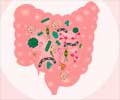
Superior performance of biofilm versus planktonic Limosilactobacillus reuteri in protection of the intestines and brain in a piglet model of necrotizing enterocolitis
Go to source).
What is Necrotizing Enterocolitis
Necrotizing enterocolitis (NEC) is a debilitating and deadly condition that affects infants who were born preterm. In NEC cases, intestinal tissues become inflamed, and in severe cases there is ischemia and death of the involved intestines. Treatment for NEC often involves surgery to remove the dying tissue. “Even after decades of research, little has changed in terms of prognosis for infants who develop NEC,” says Gail Besner, MD, pediatric surgeon and principal investigator in the Center for Perinatal Research at Nationwide Children’s. “Anywhere from 30 to 50% of infants with NEC will die from it. And even those who survive face lifelong challenges including short-gut syndrome and neurodevelopmental delays.”Ingenious Probiotic Biofilm Safeguards Gastrointestinal and Brain Well-being in NEC
Their latest study, published in Nature Scientific Reports, describes the use of a biofilm formulation of Limosilactobacillus reuteri (Lr) to prevent NEC in a piglet model.‘The probiotic SB-121 establishes a robust basis for advancing towards a clinical trial for neonates who are vulnerable to developing Necrotizing enterocolitis (NEC). #childhealth #probiotics #intestineinflammation ’
Tweet it Now
“Our previous studies have shown that the biofilm probiotic works in mouse and rat models,” says Dr. Besner. “But there are many examples where researchers find something that works in rodents, but it fails to translate to humans. We wanted to show that this approach to preventing NEC would work in an animal model that was more similar to humans.” Dr. Besner and her team therefore adapted the very challenging piglet model of NEC into her laboratory for this study. Notably, preterm piglets and preterm humans are very similar in terms of size and intestinal anatomy. Care that would normally be given to a preterm infant, including medications and fluids, nasogastric (NG) tube feedings, and round-the-clock monitoring, are all included in the model.
The data from the piglet model validated findings in rodent models. Findings demonstrate the superiority of Lr in its biofilm state compared to planktonic (free-living) Lr in preventing the morbidity and mortality associated with NEC. Importantly, Lr in its biofilm state not only protects the intestines from NEC, but protects the brain as well, a finding of great potential importance for survivors of NEC.
“The piglet is an excellent model to help prepare for studies in neonates. The data from this study help us understand the safety and efficacy profile of this novel formulation. This will be helpful as we work with the FDA to plan for future human studies,” says Joe Trebley, PhD, founder and chief executive officer of Scioto Biosciences.
A similar probiotic formulation developed by the team, SB-121, has been tested in a clinical trial in adults with autism spectrum disorder (ASD). The association between the brain and the gut symptoms in autism has been well-established in the literature, with more than half of people with autism also experiencing abdominal problems. The study, which primarily evaluated the safety of SB-121, also found that some participants showed treatment-driven improvements in their ASD test outcomes. The promising results of that phase 1b trial were published earlier this year in Nature Scientific Reports.
Advertisement
This research was funded through a $2.3M SBIR grant from the National Institute of General Medical Sciences at the National Institutes of Health. Drs. Besner, Bailey and Goodman are all scientific founders of Scioto Biosciences.
Advertisement
- Superior performance of biofilm versus planktonic Limosilactobacillus reuteri in protection of the intestines and brain in a piglet model of necrotizing enterocolitis - (https://www.nature.com/articles/s41598-023-44676-5)
Source-Eurekalert















